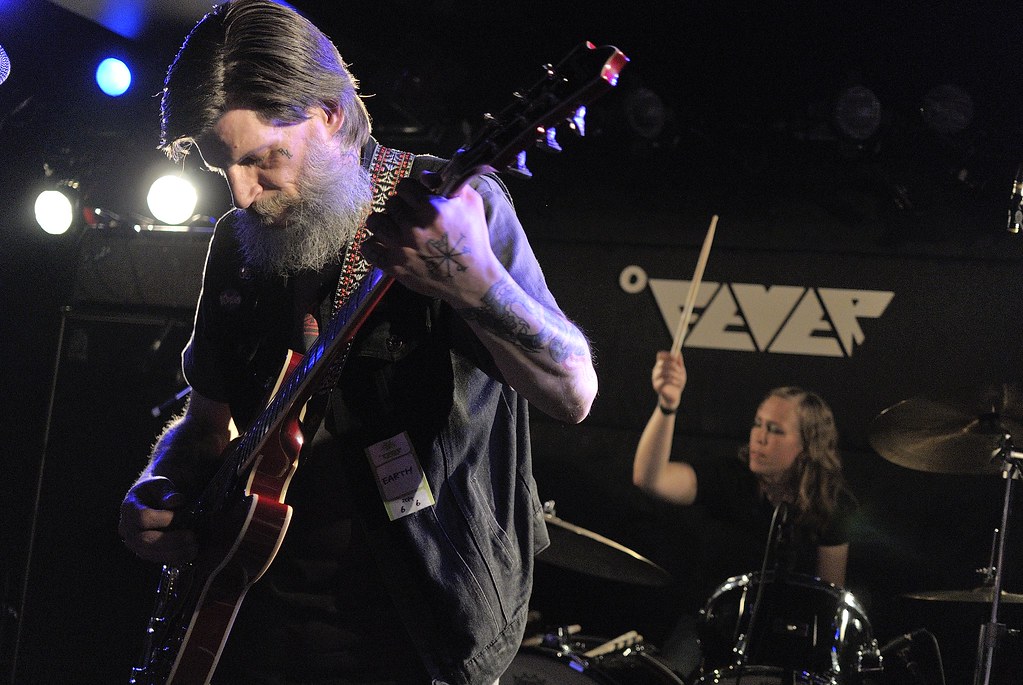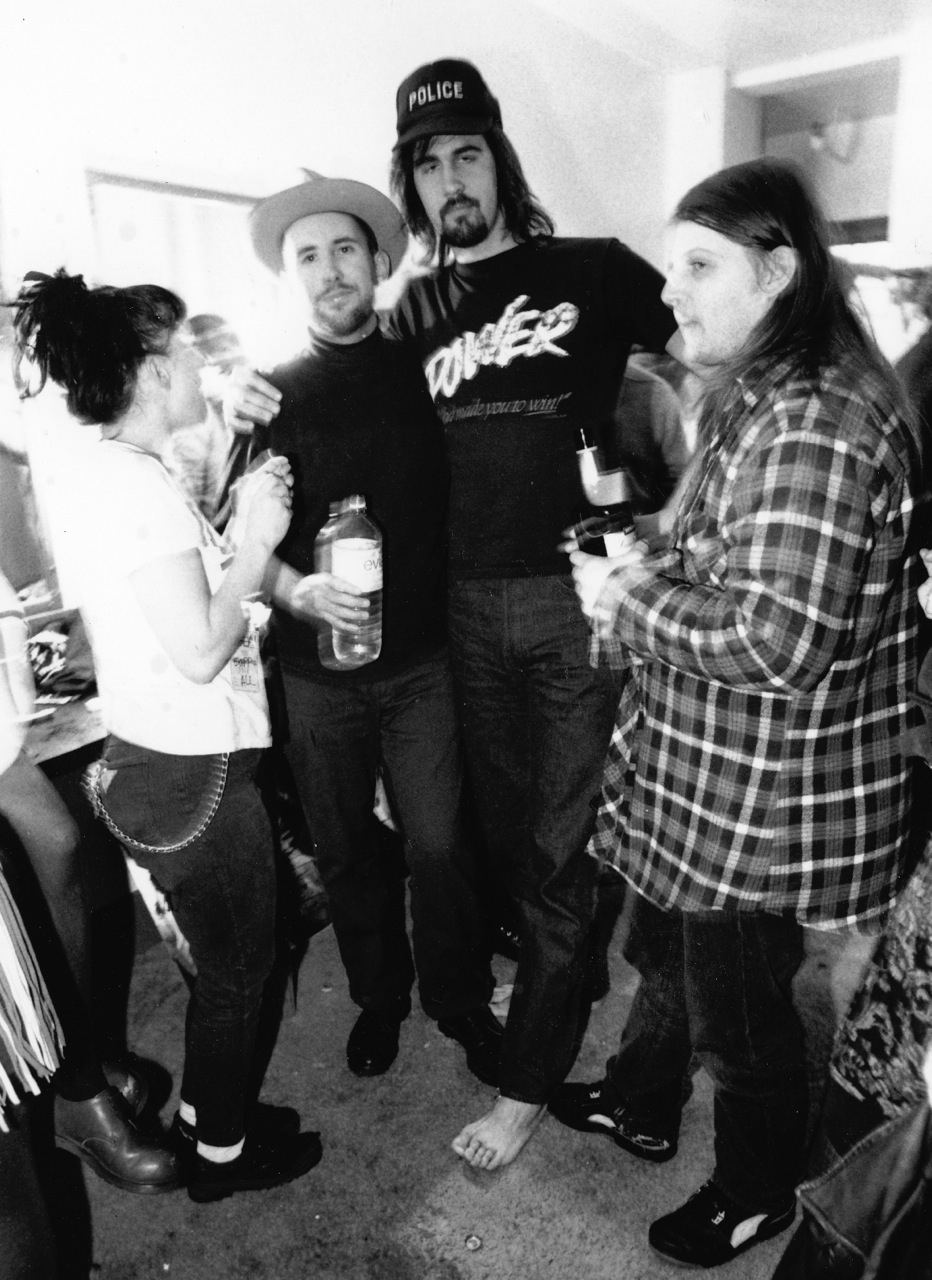
Dylan Carlson has mellowed along with his music. The early releases by Earth (the band of which he is the core member) are benchmarks in fuzzy minimalism: sedated statements that inspired legions of drone disciples. Back then, Carlson played the wild-eyed bohemian, living out the kind of artsy-Northwest fantasy Gen-Xers like to romanticize.
By contrast, the guitarist is remarkably settled these days. Married to English artist Holly — whose profile adorns the cover of his 2017 solo release Conquistador (Sargent House, 2018) — Carlson continues to hone his self-styled brand of crawling Americana. The wilderness years of addiction, incarceration, and firearms long in the rearview, presently the craziest thing about Carlson is his appearance.
With Woodstock-length locks and prodigious white facial hair, Carlson looks every bit the eccentric outlaw. A scorpion tattoo on his right cheekbone (one of many epidermal statements) hints at his desperado past. Those watery grey-blue eyes draw you in; just don’t get too close.
Down to a duo after numerous lineup permutations, Earth’s latest release, Full Upon Her Burning Lips (Sargent House, 2019) is an inspired collection: a subtly menacing web of complex riffs and sympathetic drumming. Speaking from Seattle, Carlson and longtime collaborator Adrienne Davies reflect on their easy creative process.
“We wrote a lot of the record together going to the practice place to — for lack of a better word — jam,” Carlson explains, emphasizing the term with palpable distaste.
“We’ve been playing together so long,” Davies adds, “that we speak the same musical language. There’s an unspoken thing. We know which avenues to go down and which ones to abandon.”

One avenue Carlson has resolutely abandoned is hard drugs. Asked whether substances play any creative role in Earth’s music both members jump in, displaying a mutual protectiveness of Carlson’s sobriety.
“Chai,” says Davies.
“Yeah, Chai,” agrees Carlson, chuckling. “I started doing music before I had problems. Eventually, the substances got in the way. It’s simple. Everything good in my life has come from music and if I put music first, it stays that way. You can’t serve two masters.”
To illustrate the point, Carlson tells a story. “I had a big meeting at Sub Pop and a light bulb went off in my head. It said, ‘Put the drugs first and everything else will be fine.’ Instead of going to the meeting, I went to score.”
Even clean living can have its challenges, however. “On my last solo run in Europe, I had to cancel the second half because of a gallstone. I spent a week in a Berlin hospital.” He proudly explains that he’s fine now and made up the dates: 2019’s Dylan Carlson takes his commitments seriously.
Longtime Seattleites, Davies and Carlson have watched the city’s music scene transition alongside the landscape. “When I first started it was during the golden salad days of grunge,” Carlson laughs. “The city was a lot smaller. You saw people around town at parties and shows. That whole scene was a Marketing creation, but it was a scene. There isn’t as much of that anymore.”
“We’ve always been pretty removed from that,” adds Davies.

Carlson stresses that if trends have finally caught up with Earth, it’s by pure coincidence. “I’ve always just done my own thing and I feel fortunate it’s something I get to keep doing. I’m grateful people like it and wanna listen to it,” he explains.
“We do what we do and it takes the form that comes out,” adds Davies. “Hopefully, it’s not confined to one genre.”
“I just try to follow where the music points me,” says Carlson.
That direction can be dense as an old growth-forest or open as the desert sky. Full Upon Her Burning Lips delivers more of the latter. With its baritone guitars, tasteful tom fills, and atmospheric touches, the album is spacious while remaining glued to the terra firma of the band’s name.
Like catalog standouts Phase 3: Thrones and Dominions (Sub Pop, 1995) and The Bees Made Honey in the Lions Skull (Southern Lord, 2008), the new album is rich in tone. “I view the guitar and amp as one instrument,” Carlson explains. “The electric guitar isn’t an amplified acoustic. The instrument is the interplay of the two.”
Chiming harmonics cut through the mix, pointing to both British folk and classic rock influences. In fact, there’s a cozy warmth to the guitar work that brings to mind Black Sabbath’s Tony Iommi. Carlson will take it. “Two of my favorite tones are Sabbath’s first album when he was using a Strat and the one with Ian Gillan, Born Again. Those are crazy good guitar sounds.”
Often lumped in with heavy music, he eschews such stylistic boundaries. “Heaviness is not just based on volume. It’s based on intent and melodic structure.” That attitude extends to gear. “It’s too easy to get distortion now,” Carlson explains. “There are so many overdrive pedals out there that super high gain sounds are really safe to me.”
Earth also breaks with tradition in naming its compositions. Titles like “Descending Belladonna,” “Mandrake’s Hymn,” and “An Unnatural Carousel” are as surreal and evocative as dreams. “Songs have a narrative arc, albums have a narrative arc, even if it’s incredibly vague. With instrumental music, the title is the only signpost.”
So is avoiding singing a conscious decision or circumstantial? Turns out, a bit of both. “I consider it a challenge,” Carlson says. “I don’t have anything against vocals, but I love instrumental music. At one point, back in the early ‘60s, the charts were full of instrumentals like Dick Dale and all the surf stuff, blues by Freddie King.”
“And people would dance,” says Davies.
Then there’s Carlson’s DIY-ethic: a combination of convention-bucking and pragmatism. “When I first started, I saw talented, creative people waiting for that perfect moment when they’d find the right drummer or guitarist.” He pauses. “I didn’t have time for that. Do what you can with what you’ve got.”
Davies punctuates her musical partner, completing his thought: “And do it all the way.”
In Another of World Goth Day, KEXP takes a look back at the gothic cowboy aesthetics of Carl McCoy's Fields of the Nephilim
Long-running experimental music group Sunn O))) talk to KEXP about the most recent release Life Metal, working with the late Scott Walker, and the importance of patience.
Louisville, Kentucky singer-songwriter Emma Ruth Rundle discusses her latest release (and career highlight), On Dark Horses.